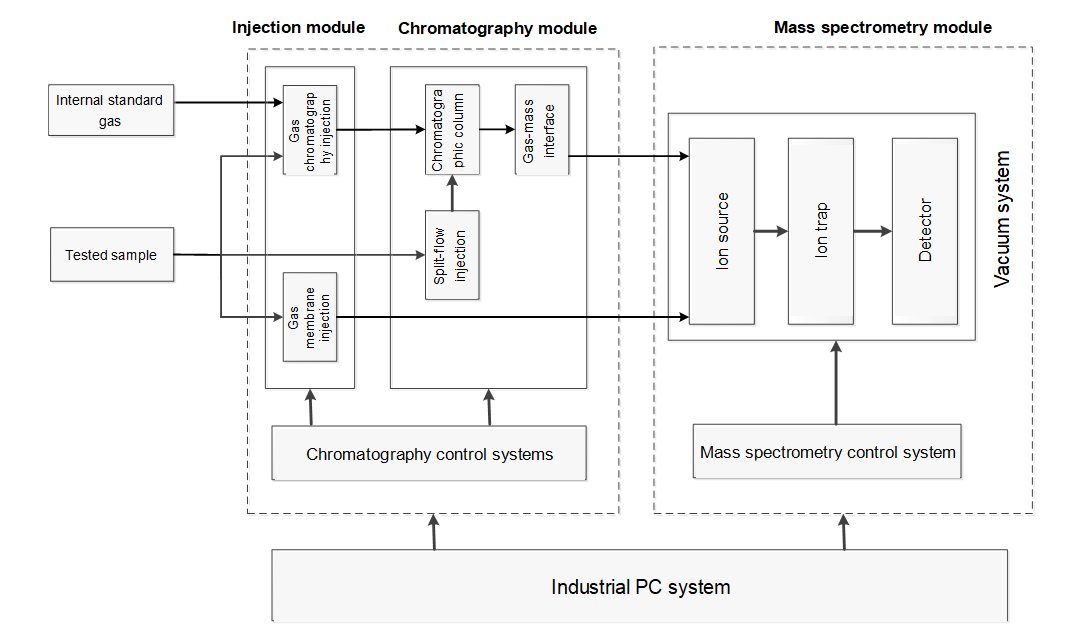The EXPEC 3500S Portable GC-MS is based on gas chromatography-mass spectrometry (GC-MS) technique for the analysis of organic pollutants in the field. It can be equipped on a mobile carrier for monitoring, or can be moved over the shoulder or handheld to sites that are inaccessible by car for rapid qualitative and quantitative analysis of volatile and semi-volatile organic chemical contaminants. The EXPEC 3500S Portable GC-MS uses a single mass spectrometer membrane injection technique, gas chromatography separation technique and ion trap mass spectrometry technique. After passing through the pre-treatment equipment, the sample is fed through a chromatographic injection system or a membrane injection system and then into a mass analyzer to be tested to obtain the qualitative and quantitative results of the sample.
The EXPEC 3500S Portable GC-MS consists of an injection system, a gas chromatography module, a gas-mass interface and a mass spectrometry module. The principle of operation is shown in Figure 1: the sample enters the chromatographic separation module through the injection system, where the sample is separated; the separated sample then enters the mass spectrometry module in turn for analysis, and finally the qualitative and quantitative results are obtained through data processing.

Figure 1Block Diagram of EXPEC 3500S Operating Principle
Advantage
As a new portable GC-MS, the EXPEC 3500S not only features a stable and reliable instrument with high environmental adaptability, but also has the advantages of fast analysis speed, high sensitivity, high contamination resistance and a wide range of injection methods.
Fast analysis speed: in addition to the separation efficiency of fast chromatography being 5 times higher than that of conventional chromatography, the membrane injection technique allows the sample to enter the mass spectrometry directly without passing through the chromatography, reducing the response time to seconds, making it very suitable for rapid screening.
A wide range of testing options: with injection modes such as direct mass spectrometry injection, sorptive thermal desorption injection, quantitative ring injection, headspace injection, needle injection and solid phase microextraction injection, covering all the current sample introduction modes on portable GC-MS applications, it enables fast mass spectrometry with second response, ambient air detection at low concentrations, pollution source detection at high concentrations, VOCs and SVOCs detection in water and soil.
Environmental adaptability: the instrument can operate at -5°C to 45°C and a low air pressure of 54kPa; it is also waterproof to IP55.
Easy software operation: intelligent wizard-based operation for sample testing and data analysis, greatly reducing training costs and complexity of field use.
The ion trap's unique multi-stage mass spectrometry scan mode: SIS scans and MS/MS scans can be performed on substances of interest, which can greatly increase detection sensitivity and reduce false positives.
Application
Environmental monitoring
Food safety
Biomedicine
Forensic and Toxicology
Biomedicine
Non-methane total hydrocarbon monitoring
Specifications
Contact: Aspen.Z
Phone: +86 18066065110
Tel: 025-87961814
Email: info@mechwhale.com
Add: Room 305, Building 8, No. 180 Software Avenue, Yuhuatai District, Nanjing City, Jiangsu Province, China